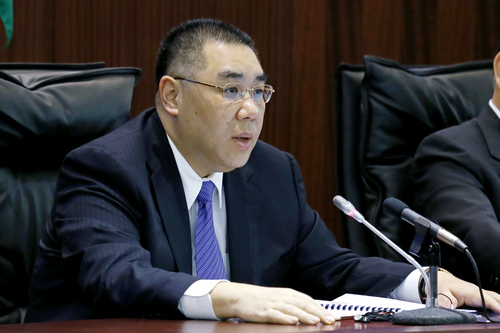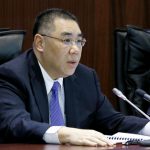 Chief Executive, Mr Chui Sai On, delivers the 2015 Policy Address at the Legislative Assembly.
Chief Executive, Mr Chui Sai On, delivers the 2015 Policy Address at the Legislative Assembly.
Macao’s economic foundation remains sound, thanks to the interim success achieved so far in efforts to diversify the economy despite the challenges this year, the Chief Executive, Mr Chui Sai On, said today. Delivering his 2015 Policy Address at the Legislative Assembly in the afternoon, his first such address in his second term of office, the Chief Executive announced that the Government would set up a committee for the development of a world tourist and leisure centre, which would be charged with drawing up a five-year development plan. Entitled ‘Coordinate planning to ensure stable development and converge collective wisdom to open new chapters’, today’s address also stressed that the Government would press ahead with the principles of ‘one country, two systems’, ‘Macao people governing Macao’ and a high degree of autonomy, with a heightened sense of responsibility, to fully implement the Basic Law of Macao and steadfastly defend the sovereignty and security of the nation as well as the long term stability and prosperity of Macao. Mr Chui said the Government would maintain a pragmatic attitude to consolidate and build on its initial success in various areas; be open-minded and actively make continuous improvements in its work; and adopt the concept of reform to resolve problems and join hands with the people of Macao, in order to open a new chapter for Macao’s development. He pointed out that 2015 marked the advent of an adjustment period for Macao’s economy against the backdrop of a complex and volatile external environment: he urged for increased vigilance against crises to achieve stable progress. He also urged for stronger regional co-operation to help Macao open up new spaces for development. Meanwhile, the Government would focus on resolving deep-rooted problems to strive for economic stability and sound employment. The highlights of the 2015 Policy Address included: 1. Coping with internal and external changes with concerted efforts; 2. Building a livable city for a quality living 3. Promoting optimum economic diversification; 4. Bettering livelihood measures, and 5. Enhancing good governance. After more than a decade of rapid growth, the gaming sector had begun to enter an adjustment period which started in the latter half of last year. Nevertheless the Chief Executive said Macao’s economic foundation remained sound, citing strong performances from the retailing, hospitality and construction industries. Mr Chui said, the Government’s fiscal standing remained strong, boasting a basic reserve of 134.327 billion patacas and a surplus reserve of 207.804 billion patacas at the end of January 2015. He estimated that the Government’s total fiscal reserve would reach 432.427 billion patacas after the settlement of the previous year’s accounts, with foreign reserves standing at 133.343 billion patacas. Commenting on the economic prospect, Mr Chui said the Government was cautiously optimistic and would prepare for rainy days. He said he would head the committee on the development of a world tourist and leisure centre, which will be established soon to draw up a five-year development plan for Macao on the basis of the region’s population policy. Mr Chui noted that the five-year plan would also guide his annual policy-making during his entire term. And in addition to the relief measures announced earlier in the 2015 Government Budget, Mr Chui announced today that the minimum subsistence index, which currently stands at 3,920 patacas per month, would be raised again in July. General disability subsidy will be increased to 7,500 patacas; special disability subsidy to 15,000 patacas; Old Age Allowance to 7,500 patacas; and monthly pension to 3,350 patacas. Secondary school students will see their stationery allowance increased to 3,000 patacas each and primary school students 2,600 patacas each in the coming year. For small- and medium-sized enterprises (SMEs), the profit tax allowance will be raised from 300,000 patacas to 600,000 patacas; and the maximum loan guarantee under the Credit Assurance Scheme for SMEs will be raised from five million patacas to seven million patacas. On housing policy, Mr Chui said the Government would conduct a comprehensive review this year and speed up the perfection of relevant legislation. He added that the Government would ensure a stable supply of public housing using a multi-pronged approach, including reviewing all existing land resources, reserving more land for public housing, and managing the issue of idle land. The Chief Executive stressed that the Government was going ahead with its plan in building 28,000 units of public housing in Area A of the reclaimed zone, noting that a thorough review and consultation will be conducted on the planning of areas B,C,D,E of the zone. On transport, Mr Chui said the Government would reduce repeat road excavations and control the growth of the number of vehicles. The Government would also build more parking spaces and pro-actively tackle delays in the construction of the Light Rapid Transit system. On environmental protection, the Government will strictly abide by the Kyoto Protocol and reduce carbon emissions by raising public awareness in energy conservation. A public consultation on an environmental impact assessment system will be launched in the near future while more buses running on natural gas will be introduced. On public security, the Government will strive to apply technology in building a strong and efficient police force. Co-operation between the police and the community will be strengthened to combat crime more effectively while the cross-departmental crises response mechanism will be enhanced. The Government will strengthen co-operation with the World Health Organization, the health administrations in the mainland and neighbouring areas on the prevention and control of new infectious diseases. The Government will roll out more measures to ensure food safety, such as strengthening quarantine and management. Mr Chui said adequate economic diversification was the trend of development. The Government will strive to make steady development in the gaming consolidation period after experiencing a decade of rapid growth in the industry. At the time of reviewing and re-evaluating the development of the gaming industry, the Government urges gaming operators to provide accommodation and transportation for their non-resident employees. The Government pays close attention to the city’s capacity in receiving visitors, especially during the mainland’s peak travel periods. A report will be submitted to the Central Government, he said, for the optimisation of the facilitated individual travel scheme and exploration of development model to ensure the people’s quality of life and the visitors’ travel experience. In “Ensuing stable development”, the Chief Executive highlights the Government’s supports for the development of convention and exhibition, cultural and creative, and Chinese traditional medicine industries, and the cultivation of environmental protection. A statistical benchmark system for the emerging industries will be established, including more international standards on regulating Chinese medicine. To encourage cultural creation, the Government will set up the Cultural Industry Incentive Scheme to fortify enterprises, individuals and associations with prominent contributions in the industry. Taking into account the healthy fiscal surplus and the welfare spending in an aging society, the Government will establish a SAR Investment Development Fund to allocate resources to better protect the livelihood of the people. The Government will also construct a long-term mechanism for allocation of fiscal surpluses, and a fund allocation mechanism that links fiscal surplus with the Social Security Fund, to rationalise wealth sharing in the society. “Maintaining a stable economic development and progressively adjust economic structures” is to securely protect the job opportunities for the people and continuously bettering the livelihood of the disadvantaged group. He said he hoped the bill on minimum wage for workers in property management and cleaning would be passed in the Legislative Assembly, while he also pledged to progressive introduce a system that would apply to all workers. After collecting opinions across various sectors, the Government has submitted the Macao Special Administrative Region’s development blueprint to the Central Government on the nation’s 13th Five Year Plan, stressing the establishment of a world centre for tourism and leisure and a commercial and trade co-operation service platform between China and the Portuguese-speaking countries. On regional co-operation, the Government will strictly comply with the general requirements regarding the State Council’s approval of commencing work on specifying the SAR’s jurisdiction over its customary waters. The Government will make best use of the Closer Economic Partnership Arrangement (CEPA) and its supplementary agreements, projects of the Framework Agreement on Co-operation between Guangdong and Macao, such as trade liberalisation and innovative structural reforms with the Guangdong government. Speeding up co-operative projects in Hengqin, Nansha and Cuiheng, the Government expects arrangements on cross-boundary pleasure crafts between Macao and Zhongshan will be completed this year. The Government will continue to explore new models on boundary crossing and intensify co-operations with Zhuhai, Fujian and Beijing through a well-established Hong Kong-Macao communication system and functions of the Macau Economic and Cultural Delegation in Taiwan. On social services, he said the Government will expedite the construction of homes for the elderly, and allocate more resources for projects in co-operation with non-government organisations. To build an integrated society, the Government will press ahead on formulating the ten-year development plan for rehabilitation services, and in completing the ten-year action plan for elderly service On education, the Government will continuously optimise the 15-year compulsory, free education system and foster a ten-year plan on non-tertiary education. To accommodate economic diversification, the Government will carry out short-, medium- and long-term measures on the cultivation of elites, professional and multi-dimensional personnel, and provide continuous training to increase upward mobility. Optimisation on the medical system is prioritised in his policy blueprint, Mr Chui said, adding that facilities of Islands District Medical Complex had entered the final design stage and construction will commence in phases, with the infectious disease rehabilitation centre to commence operation this year. The Government will incessantly strengthen governance transparency, safeguarding the freedom of the press, publication and speech. To put his policy vision of streamlining government resources into action, Mr Chui said there would be regulations for consultative bodies, specifying that tenures should be for two to three years. Community representatives may be re-elected or re-appointed once or twice; but no one should stay in the same position for more than six years nor hold positions in three or more bodies at the same time. On public administration, the Government will conduct a comprehensive research on the functional restructuring of organisational structure, set an inter-departmental co-operation mechanism to enhance administrative efficiency. In accordance with the Basic Law the Government considered establishing a municipal organisation that has no political power, he said. A comprehensive review on the entry and position allocation mechanism under the centralised recruitment system will be conducted. The Government will take measures to establish the accountability of civil servants in every level and to optimise evaluation system of leading officials. He said the Government would strictly abide by the Basic Law and the related decisions of the Standing Committee of the National People’s Congress, and fully listen to the opinion from all walks of life, to push forward democratic and political developments.


